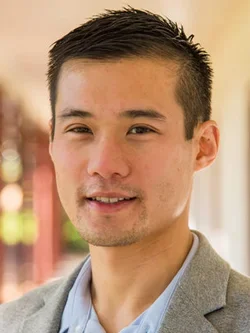Summer 2022 E-Newsletter

In This Issue:
- Brief Screening Tool Helps Identify Patients with Dementia
- An Unexpected Discovery: TMEM106B Fibrils in Frontotemporal Lobar Degeneration
- New Addition to the Easton Center
- Clinical Trials
- Upcoming Events
The Mary S. Easton Center for Alzheimer’s Research and Care at UCLA has very active teams working on basic research, drug discovery, biomarkers for early diagnosis and clinical activity including clinical trials, cognitive testing, and patient care.
Brief Screening Tool Helps Identify Patients with Dementia

By: Timothy Chang, MD, PhD, and Samantha Shah, BS
Asking older patients three quick questions may lead to earlier detection and timely diagnosis of cognitive decline. For people with dementia and their loved ones, taking early action to manage the challenges of the condition can lead to an improved quality of life. Yet many with dementia are not diagnosed until the later stages. Delay in the diagnosis may occur due to the stigma attached to Alzheimer’s disease or people thinking cognitive decline is part of normal aging. Another reason is that primary care providers (PCPs) do not have enough time to ask about cognitive health. To address the latter issue, we have developed a brief dementia screening tool to help PCPs evaluate possible dementia in less than five minutes. This summer, it will be introduced at the
UCLA Family Health Center in Santa Monica. The longer-term goal is to expand its use to all UCLA Health primary care clinics.
The screening tool was designed in order to be easy to use and seamlessly integrated into a patient’s electronic health record. This will allow PCPs to access relevant information quickly when making clinical decisions and reference results over the years.
The questionnaire consists of three yes/no questions. They ask about changes in memory/thinking, language and mood/personality within the last five to ten years. Each question comes with examples of changes to prompt accurate responses. For instance, when asked about changes in memory/thinking, an example on having trouble recalling important events is included. The questionnaire has a version for the patient, and an additional one for an informant. The informant version is designed to be completed by someone who knows the patient well, such as a family member (Figure 1). Screening will be completed once a year in patients ages 60 and older at visits like an annual check-up.
Some patients with early cognitive issues might not believe or say they have noticed changes. Having input from an informant who knows the patient well can be very helpful. But because an informant is not always available, the PCP can also conduct a very short neuropsychological test called the Mini-Cog, which is available in English and Spanish. The Mini-Cog is already well-established in clinical use and can be administered quickly.



